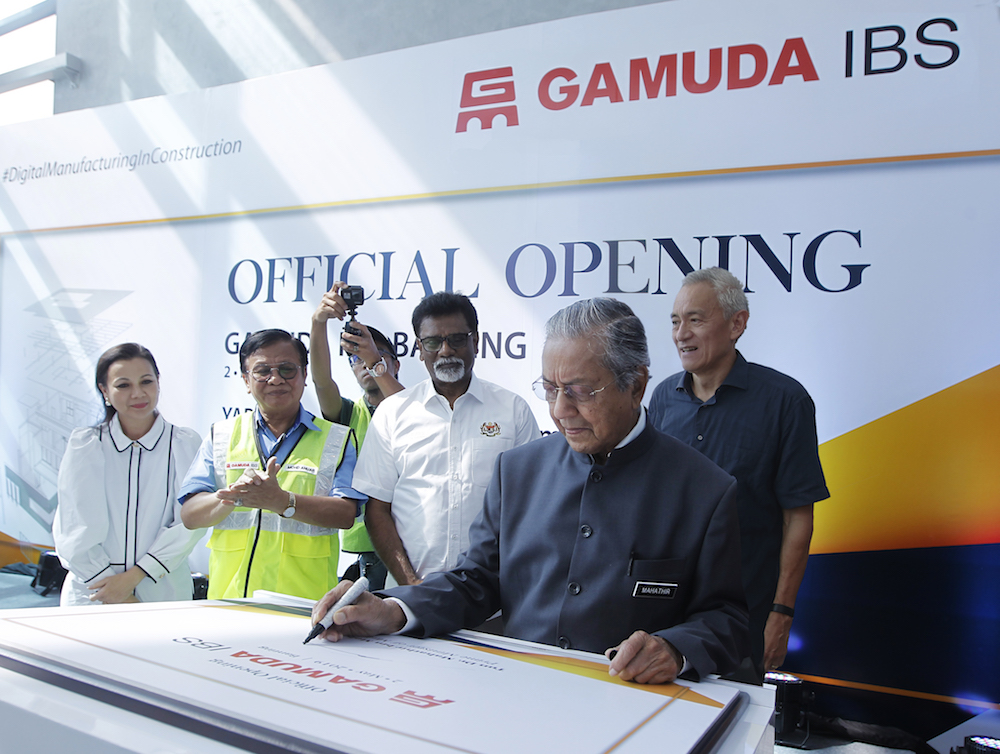KUALA LUMPUR, May 2 — Innovation and digital technology will be the way forward in tackling the demand for affordable houses in the near future, said Prime Minister Tun Dr Mahathir Mohamad.
He said the use of digital Industrialised Building System (IBS) and the Building Information Modelling (BIM) integrated digital design system in public housing projects will help the government to meet its one million affordable houses target within ten years.
“I was informed that digital IBS provides an opportunity to upscale our local workforce for the future, and moving forward, the technology will enable developers to build cheaper homes in a shorter period of time.
“It is also less labour-intensive, thus reducing the country’s dependency on foreign workers and yearly outflow of capital,” he said in his speech when officiating Gamuda Bhd’s IBS digital plant in the Bandar Mahkota Banting industrial area, here today.
Also present at the ceremony were Water, Land and Natural Resources Minister, Dr Xavier Jayakumar, Deputy Works Minister, Mohd Anuar Mohd Tahir, Gamuda group managing director, Datuk Lin Yun Ling and Gamuda board member Raja Datuk Seri Eleena Sultan Azlan Shah.
Dr Mahathir added that affordable houses, coupled with easy accessibility via an integrated public transport infrastructure (including rail), will improve connectivity and spur business activities and economic growth.
“This is in tandem with the government’s aspiration and strategy for national housing.
“Apart from that, embracing digital IBS technology is timely as it is evolving with the Fourth Industrial Revolution (IR 4.0), the current trend of automation and manufacturing technologies that include cloud computing and BIM,” he said.
Dr Mahathir also commended Gamuda, a pioneer in digital IBS adoption in the country, for investing more than RM500 million on their two state-of-the-art factories in Sepang and Banting.
He said Gamuda’s move in developing digital IBS will not only help the government in building affordable houses but also set the trend in elevating and shifting construction.
“Digital IBS will result in faster construction, substantial reduction of foreign workers dependency in the construction sector, substantial upskilling and localisation of the Malaysian construction workforce and superior quality.
“I was informed that the affordable homes will be built with the same standard as high-end luxury homes. This is the type of disruptive technology the country needs more of,” he said.
Like other developing countries, he said, one of the government’s top priorities is to provide an efficient supply of affordable houses to ensure the well-being and upward mobility of Malaysians.
Such a commitment is inherently important if the government desires to help the lower income group by enabling them to have a comfortable living space in the right location which allows them to pursue employment and other economic opportunities, he said.
Dr Mahathir added that this will elevate their social-economic status and contribute to healthy economic growth for the nation.
“The National Housing Policy (2018-2025) focused on social housing issues at the local community level, especially in low-cost stratified housing areas nationwide and having a centralised agency to coordinate its efforts.
“The Housing and Local Government Ministry, under National Housing Policy, aims to build up to 100,000 affordable homes capped at RM300,000 by the end of the year, in line with the Pakatan Harapan government’s manifesto of constructing one million affordable housing within the next decade,” he said.
Gamuda’s 27-hectare IBS digital plant in Banting is the latest IBS factory in the country, integrating online design tool, BIM platform and equipped with robotic machines for constructions. — Bernama



















